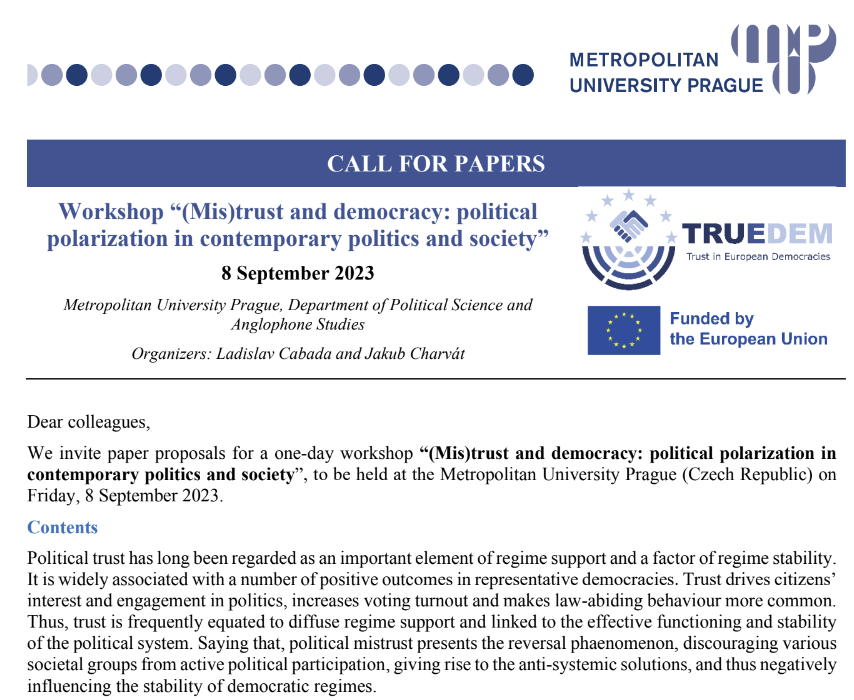

(Mis)trust and Democracy: Political Polarization in Contemporary Politics and Society
Fri, 08 Sep 2023 - Fri, 08 Sep 2023
Prague, Tchéquie
Organized by: Metropolitan University Prague
Contact: office@truedem.eu
Political trust has long been regarded as an important element of regime support and a factor of regime stability. It is widely associated with a number of positive outcomes in representative democracies. Trust drives citizens’ interest and engagement in politics, increases voting turnout and makes law-abiding behaviour more common. Thus, trust is frequently equated to diffuse regime support and linked to the effective functioning and stability of the political system. Saying that, political mistrust presents the reversal phaenomenon, discouraging various societal groups from active political participation, giving rise to the anti-systemic solutions, and thus negatively influencing the stability of democratic regimes.
One of the key elements influencing political (mis)trust comprise the new forms of political polarization. In the last two decades we can observe visible rise of impulses negatively influencing the political trust; this trend is often labelled as polycrisis. Nevertheless, many indicators and signs of growing mistrust might be reflected already in 1960s-1980s, as for example the growth of new social movements and the related phaenomenon of Partaienverdrossenheit and party dealignment manifest. The continual erosion of traditional “Rokkanian” cleavages, destabilisation of post-WW II party systems, dramatic decline of party membership, the revolution in mass communication related with the social media, as well as the onset of media parties, business-firm parties, and entrepreneurial parties present challenge for both the political practice as well as the expert reflection.
The aim of our workshop is to address the substantial and even fundamental changes regarding the socio-political and socioeconomic cleavages in European societies that have implications for political trust, including such trends as: erosion of old and emergence of new political cleavages; shift towards the axiological cleavage/s and/or cultural backlash; radicalization of political attitudes and increased polarization; strengthening of ´bad civil society´; erosion of old identities and party alignments; emergence of new social movements and political parties; decline in party membership, individualization of citizens attitudes. The workshop and individual papers will contribute to identifying and reflecting on the most important emerging cleavages and polarizing trends across the European societies related to the general trends of (de)globalization and (counter)cosmopolitism (new and/or transformed socio-economic divisions, intergeneration conflicts, gender, new forms of nativism and nationalism etc.), as well as their influence on the state and trends of political trust across the European societies.
The workshop aims to systematize and deepen our understanding of the intersection of political polarization and trust. Specifically, our workshop aims to stress and reflect on two issues:
1) The polarization–trust nexus, i.e. how the interconnection between the polarization and trust might be reflected in partial cases and how it might be generalised in new or transformed theories and concepts. Also the papers discussing and presenting different methodological issues such as indicators and measure that might be used for the research of trust and polarization are welcomed.
2) Legacy of (mis)trust). In Eastern and Central Europe, the legacy of (mis)trust presents one of important long-term trends in the societies. Such phaenomenon was related with the creation of nationally oriented civil societies within the Habsburg Empire, as well as with the existence of different types of opposition against the Communist regimes. In both, as well as other cases (mis)trust presented the creative impulse for political participation and representative democracy. We assume that similar development – and legacy – might be found also within the hybrid regimes and soft authoritarian regimes in the region.
In addition to the two above-mentioned “flagship” themes, we invite proposals discussing other topics that address the interplay of political polarization and political trust. We welcome both papers discussing single-country case studies and papers employing comparative cross-country perspective. Researchers and scholars at any stage of academic career, from various domains of Social Sciences are encouraged to apply.
Please submit your application to ladislav.cabada@mup.cz and office@truedem.eu by 4 August 2023, including: Title; Abstract (max. 300 words), specifying theoretical argument, data, methods, and geographical scope; Author(s); Name and affiliation of the presenter(s).
Notifications of acceptance or rejection will be sent out by 14 August.
The workshop will be hosted at the Department of Political Science and Anglophone Studies, Metropolitan University Prague. Light refreshments will be offered onsite in the lunch break. Participation is free of charge; no registration fees apply. The host institution does not cover the accommodation and travel costs. Please do not hesitate to contact us with any questions you may have, and feel free to share this call widely. We look forward to your contributions and to seeing you at the Metropolitan University Prague!











